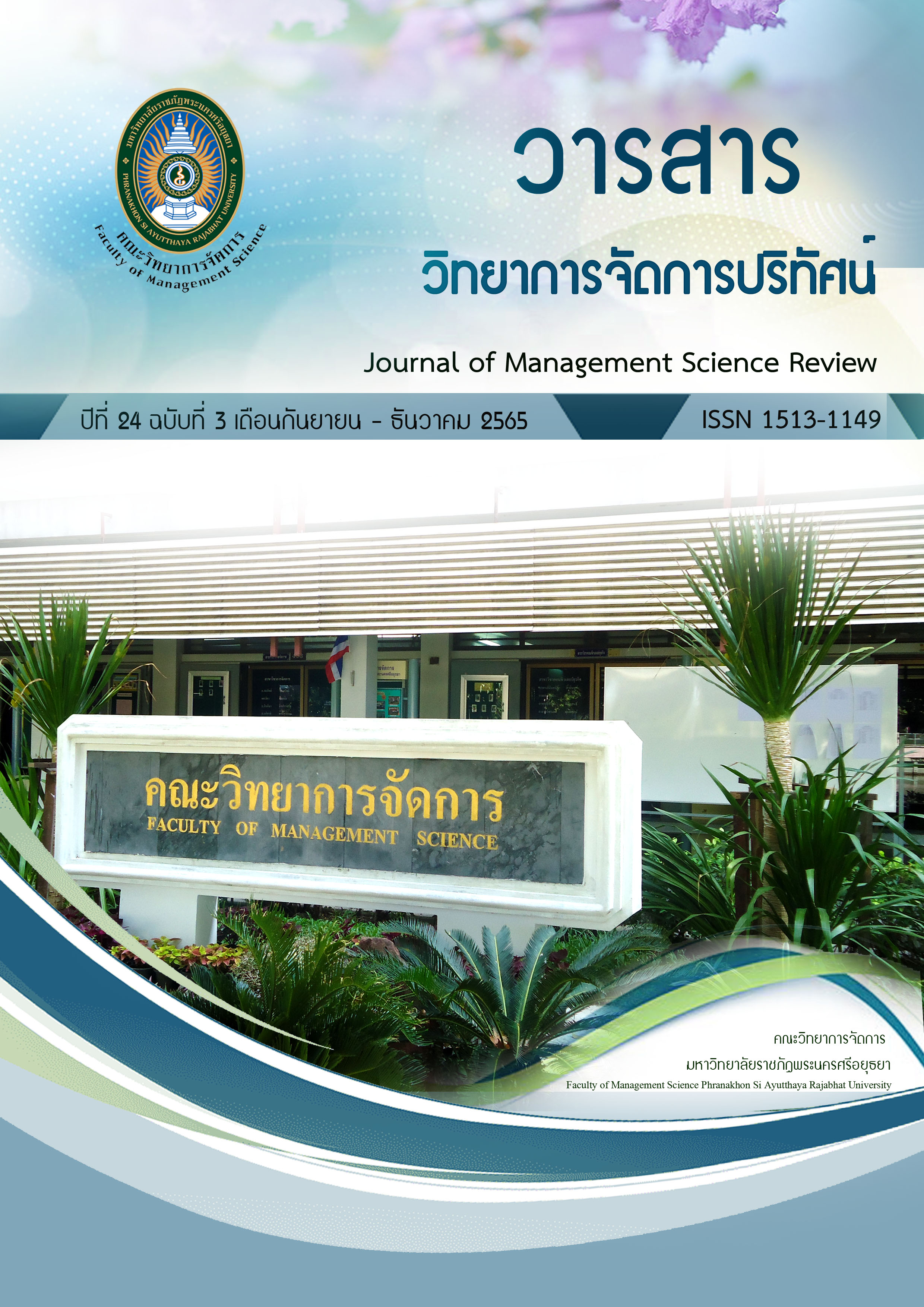Change Management under the Disruption Era of Private Companies in Bangkok Metropolitan Region
Keywords:
Change Management, Disruption Era, Private CompanyAbstract
The objectives of this research were 1) to study the management of change under the disruption of private companies in the Bangkok Metropolitan Region, 2) to study the factors affecting the change management under the disruption, and 3) to propose guidelines for developing change management under the disruption environment. The samples for this study consisted of 400 private company employees and 4 private company executives in Bangkok Metropolitan Region. The questionnaires and interviews were upon as research tools and the frequency, percentage, mean, standard deviation, t-test, one-way ANOVA, and multiple regression were used as the statistics for data analysis.
The results showed that 1) executives in economic disruption can work more efficiently which focuses on decentralizing decision-making and product creation by using technology to help expand production capacity, 2) Factors of monthly income and position affecting change management under economic disruption of private companies in Bangkok Metropolitan Region were significantly different at 0.05 level, and 3) novelty to With customers and being more responsive to current customer behavior should be a guideline for management under economic disruption.
References
จีราภา ประพันธ์พัฒน์. (2560). การศึกษาภาวะผู้นำเชิงนวัตกรรมของผู้บริหารสถานศึกษาตามความคิดเห็นของครูสังกัดสำนักงานเขตพื้นที่การศึกษาประถมศึกษาปทุมธานี. วิทยานิพนธ์ศึกษาศาสตรมหาบัณฑิต สาขาวิชาการบริหารการศึกษา, มหาวิทยาลัยเทคโนโลยีราชมงคลธัญบุรี.
ชาติชาย คงเพ็ชรดิษฐ์ และธีระวัฒน์ จันทึก. (2559). การบริหารการเปลี่ยนแปลง: บทบาทของภาวะผู้นำและการสื่อสารในองค์การ. วารสารฉบับภาษาไทย สาขามนุษยศาสตร์ สังคมศาสตร์ และศิลปะ, 9(1), 895-919.
ติรยา สรรพอุดม. (2560). ความต้องการในการพัฒนาตนเองของพนักงานบริษัทผู้ผลิตเครื่องดื่มแห่งหนึ่งในนิคมอุตสาหกรรมอมตะนคร จังหวัดชลบุรี. วิทยานิพนธ์ รัฐประศาสนศาสตรมหาบัณฑิต, มหาวิทยาลัยบูรพา.
ภานุวัฒน์ ตริยางกูรศรี. (2560). แนวทางการปฏิรูปอุตสาหกรรมด้วยเทคโนโลยีและนวัตกรรมผ่านกลไกสนับสนุนจากหน่วยงานภาครัฐ. กรุงเทพฯ: กรมส่งเสริมอุตสาหกรรม.
เยาวภา อาทิตย์ตั้ง. (2559). ความสัมพันธ์ระหว่างภาวะผู้นำการเปลี่ยนแปลงกับการทำงานเป็นทีมของครูสังกัดสำนักงานเขตพื้นที่การศึกษามัธยมศึกษา เขต 27. วารสารบัณฑิตศึกษา, 13(60), 167-178.
ลฎาภา ธนจิรทีปต์. (2559). อิทธิพลภาวะผู้นำเชิงพฤติกรรมของหัวหน้างานที่ส่งผลต่อแรงจูงใจในการปฏิบัติงานของพนักงานระดับปฏิบัติการ ภาคพื้นและประสิทธิผลองค์กรสายการบินต้นทุนต่ำแห่งหนึ่ง. วิทยานิพนธ์บริหารธุรกิจมหาบัณฑิต, มหาวิทยาเทคโนโลยีราชมงคลพระนคร
วริศนันท์ ศรีเอกบุญรอด. (2558). รูปแบบภาวะผู้นากับประสิทธิภาพการปฏิบัติงานของพนักงาน. วิทยานิพนธ์บริหารธุรกิจมหาบัณฑิต สาขาวิชาบริหารธุรกิจ, มหาวิทยาลัยเวสเทิร์น.
วิโรจน์ สารรัตนะ. (2555). แนวคิด ทฤษฎี และประเด็นเพื่อการบริหารทางการศึกษา (พิมพ์ครั้งที่ 8). กรุงเทพฯ : ทิพยวิสุทธิ์.
สุกฤษฎิ์ ขวัญเมือง. (2559). การศึกษาความสัมพันธ์ของภาวะผู้นำแบบสร้างความเปลี่ยนแปลงที่ส่งผลต่อความพึงพอใจในงานและความผูกพันต่อองค์การของข้าราชการสังกัดกรุงเทพมหานคร. การค้นคว้าอิสระบริหารธุรกิจมหาบัณฑิต, มหาวิทยาลัยธรรมศาสตร์.
สุภาพร กันสุด. (2558). การศึกษาภาวะผู้นำการเปลี่ยนแปลง ประสิทธิผลการใช้งาน และบรรยากาศในการทำงาน ที่มีผลต่อการยอมรับการใช้งาน Google Application ในระบบอินทราเน็ต: กรณีศึกษาพนักงานบริษัทเอกชน เขตกรุงเทพมหานคร. การค้นคว้าอิสระบริหารธุรกิจ มหาบัณฑิต, มหาวิทยาลัยกรุงเทพ.
อรัญญา โคเซนติโน และเทียน เลรามัญ. (2560, มกราคม-มีนาคม). การบริหารการเปลี่ยนแปลงองค์กรเพื่อรองรับนักท่องเที่ยวชาวจีน กรณีศึกษา โรงแรมระดับ 4 ดาว ในเขตตำบลช้างคลาน จังหวัดเชียงใหม่. วารสารวิจัยเพื่อพัฒนาชุมชน (มนุษยศาสตร์และสังคมศาสตร์), 10(1), 101-110.
อุทรณ์ โขมะนาม. (2560). ความสัมพันธ์ระหว่างภาวะผู้นำการเปลี่ยนแปลงของผู้บริหาร กับแนวทางการบริหารโรงเรียนนิติบุคคลของสถานศึกษาขั้นพื้นฐาน สังกัดสำนักงานเขตพื้นที่การศึกษามัธยมศึกษา เขต 1. วิทยานิพนธ์ปริญญาครุศาสตร มหาบัณฑิต สาขาวิชาการบริหารการศึกษา, มหาวิทยาลัยราชภัฏธนบุรี.
Liu, C., Iddir, H., Benedek, R. & Curtiss, L. A. (2016, June). Investigations of Doping and Dissolution in Lithium Transition Metal Oxides Using Density Functional Theory Methods. The Electrochemical Society. from doi 10.1149/MA2016- 03/2/452
Mouloua, M. (Ed.). (2018). Automation and human performance: Theory and applications. Routledge.
Petronio, S. (2015). Communication privacy management theory. The international encyclopedia of interpersonal communication, 1-9.
Priest, S. & Gass, M. (2017). Effective leadership in adventure programming (3 rd ed.) Champaign, Illinoi: Human Kinetics.
Radnor, Z., Osborne, S. & Glennon, R. (2016). Public management theory. In Ansell, C. & Torfing, J. (Eds.). Handbook on Theories of Governance (pp. 46-60).
Edward Elgar Publishing. from https://doi.org/10.4337/9781782548508
Stevens, C., Thibodeaux, L. J., Overton, E. B., Valsaraj, K. T. & Walker, N. D. (2017). Dissolution and Heavy Residue Sinking of Subsurface Oil Droplets: Binary Component Mixture Dissolution Theory and Model-Oil Experiments. Journal of Environmental Engineering, 143(10), 04017067.
Waring, S. P. (2016). Taylorism transformed: Scientific management theory since 1945. UNC Press Books.Western, S. (2019). Leadership: A critical text. SAGE Publications Limited.
Yu, M., Cui, H., Ai, F., Jiang, L., Kong, J. & Zhu, X. (2018). Terminated nanotubes: evidence against the dissolution equilibrium theory. Electrochemistry Communications, 86, 80-84.





